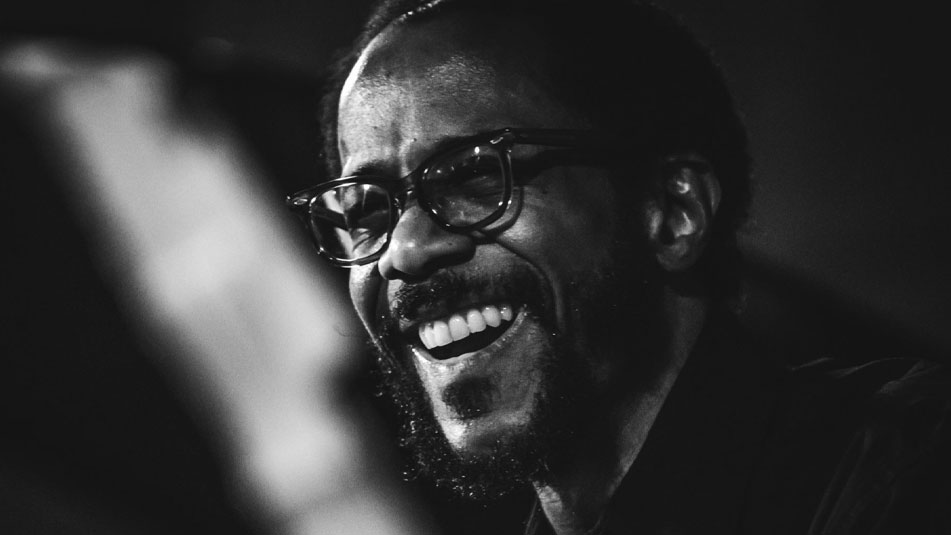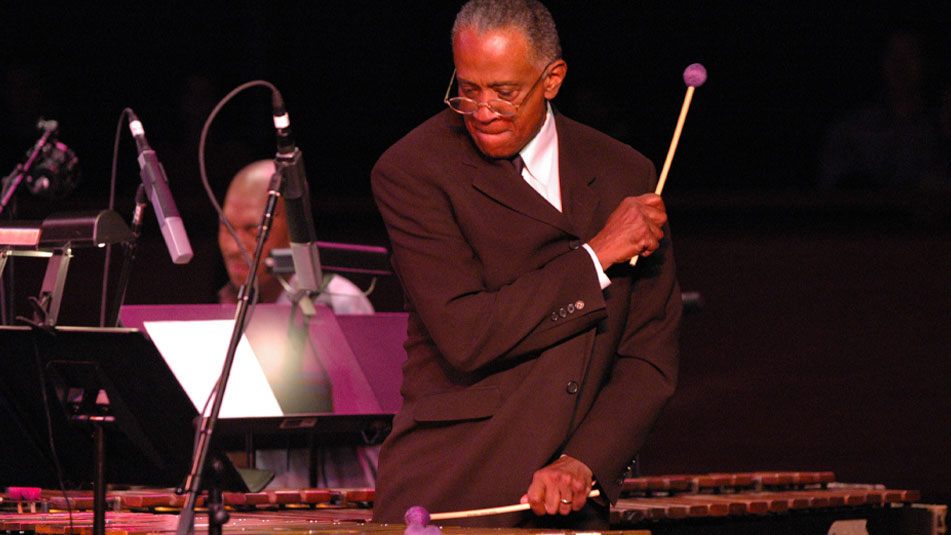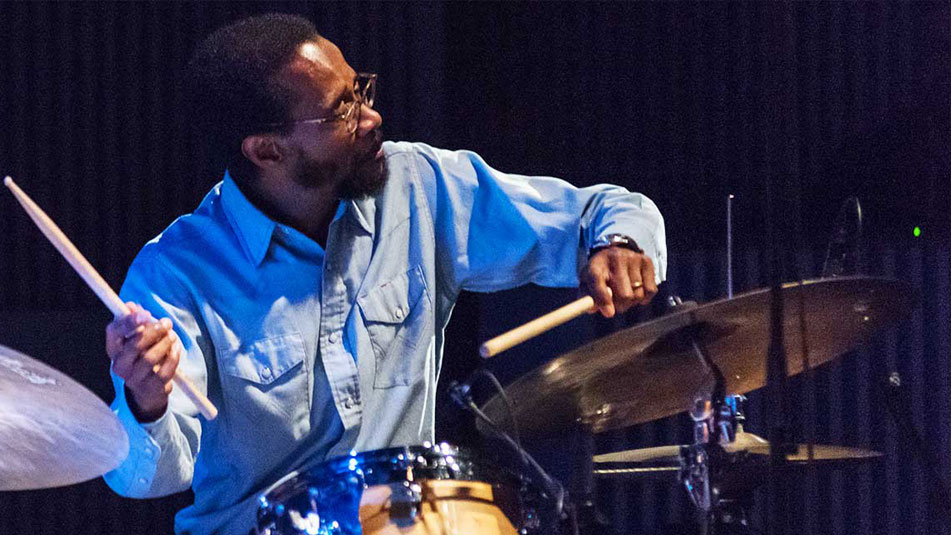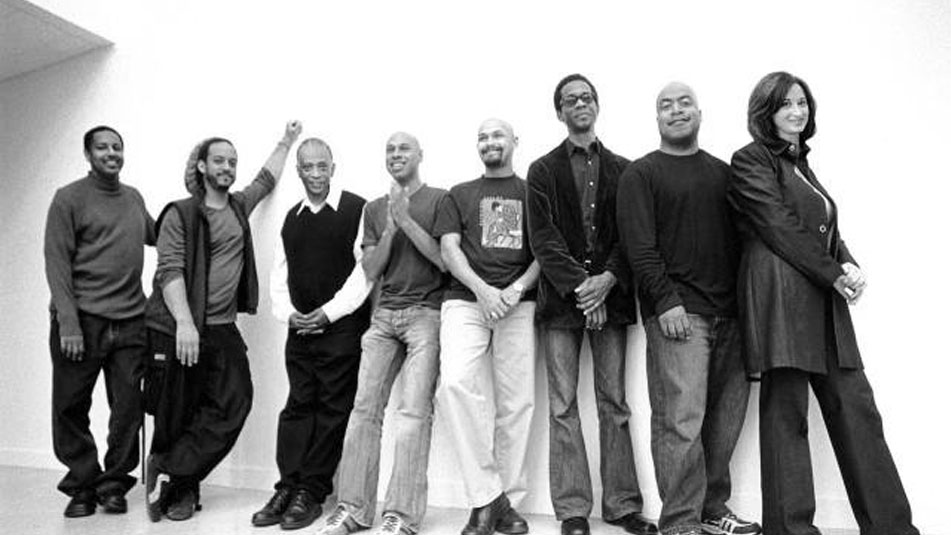Brian Blade & Life Cycles:
Uncorking The Spirit of Bobby Hutcherson
September 3, 2019 | by Richard Scheinin

Brian Blade (Photo Credit: Adrien H. Tillmann)
When Brian Blade sits down behind the drums, he’s like a kid in a candy shop. His face lights up. He’s in love with the music. He’s channeling something powerful. And he hasn’t lost the element of play, of pure pleasure and discovery. Sometimes, he’ll take one exuberant swipe at his drum kit — WHAM! — and in that instant, everything changes. The band’s performance levitates.
It’s all very reminiscent of Bobby Hutcherson, the late vibraphonist who mentored Blade 15 years ago, when they were founding members of the SFJAZZ Collective, the San Francisco-based octet. The vibraphonist had been a key figure in the jazz explosion of the 1960s. He was both innovator and traditionalist, and he taught Blade something about spontaneity and exuberance — about uncorking the spirit. Now with his band Life Cycles, Blade is expressing his gratitude by performing the music from one of Hutcherson’s memorable albums: Now!, recorded in 1969. Half a century has passed, yet it still telegraphs the struggles of those times, while conveying a timeless set of moods and feelings: “It’s imbued and infused with this spirit that Bobby was gifted with — it’s like God gave Bobby an incredible joy. And with one strike of the vibraphone — one note! — you would feel it,” says Blade, who recently re-recorded Now! with Life Cycles (for release in 2020) and is taking the music on tour this fall (including to SFJAZZ on Sept. 28). The drummer describes his response to Now! as “a personal thing. Like with most art, we all come at it with our own interpretations. But to me, man, I think it’s bringing us closer to God. I think that’s why I respond to it. For me, it’s telling us of something greater than these earthly bonds, and of how to actually walk” — he laughs softly — “through this 'slow change’ while we’re here.”

Bobby Hutcherson
Now! encompasses the conflicting moods of the ‘60s: the sense of hope and possibility, along with frustration and outrage over the War in Vietnam and the struggle for civil rights. “Slow Change,” the opening track, is filled with tension and beauty. It levitates — that word again — rising from the shimmer of Hutcherson’s vibes, from Harold Land’s swirling tenor saxophone and from Joe Chamber’s floating drum chatter. It’s “a soul-freeing anthem,” says Blade, who recites some of the lyrics, written and sung by Gene McDaniels:
Catch the spiral falling upward
God is watching
God is dying
Slow change
Blade has experienced his share of uplifting music; his collaborators have included Bob Dylan, Wayne Shorter, Joni Mitchell and Herbie Hancock. But there is something about “Slow Change”; he gets the chills, he says, just thinking about the song. The five tracks on Now! emerge as a suite, almost as a tone poem, and as a call for freedom: “The Now! album, it’s specifically speaking to where Bobby was in 1969,” Blade says, “and to where we were as a people — and it still speaks, at this moment in 2019, of that great need that remains.”
Brian Blade performs with Wayne Shorter, Herbie Hancock and Dave Holland
In 1969, Hutcherson moved from Pasadena to San Francisco, renting an apartment for his family in the Haight-Ashbury district. You can feel San Francisco in the music of Now!, in its open attitude. There’s Coltrane modality — super-intense on Land’s “Black Heroes” — along with funky conga drums and slinky electric guitar. There are even hints of singer-songwriter acoustic folk music on “Hello to the Wind,” composed by Chambers and McDaniels. (As a composer, McDaniels hit the charts in 1969 with his political anthem “Compared to What,” recorded by Les McCann and Eddie Harris at the Montreux Jazz Festival.)
Now! is as wide open as the times in which it was recorded. Hutcherson was 28. He was feeling life deeply. The title track is a tender song, pure sadness — his tribute to a friend, bassist Albert Stinson, who had died that summer at age 24.
Fifty years later, Life Cycles turns out to be a close fit for Now! The band’s instrumentation — vibraphone and vocals; saxophone and piano; guitar, bass, drums and percussion — is a match for the group Hutcherson brought into the studio on October 3 and November 5, 1969. But that’s pure coincidence: “With some things, there’s no grand plan,” Blade says. “It’s like you're reaching out at something that you don’t even see, but then it just reveals itself: Hey, look at this!”
The story begins in 2000 when the drummer’s best-known band — the Brian Blade Fellowship — was in between tours. Melvin Butler, one of the group’s two saxophonists, was doing graduate fieldwork in Haiti, working toward his PhD in ethnomusicology. Christopher Thomas, the bassist, was living in Los Angeles, working on his own musical project. But the band’s other members — pianist Jon Cowherd, saxophonist Myron Walden, and Blade — were living in the New York area and itching to perform. “So we called some of our friends who also were around New York,” recalls Blade, who now lives in Shreveport, La., where he grew up. “We called (bassist) Doug Weiss and (vibraphonist and vocalist) Monte Croft and (guitarist) John Hart, and that’s how Life Cycles got started. It became sort of our local band that played mostly underground in the clubs; we originally called it the Subterranean Sextet.”
Cowherd, Walden, Hart and Blade composed tunes for the band, which also performed at a handful of festivals, but the music was never recorded — and the group basically vanished. “Then seventeen years go by,” says Blade, sighing. Off and on, he had thought about Life Cycles, and now certain ideas began to crystalize: Why not record those original tunes, and why not put together a Bobby Hutcherson project? In Monte Croft, the group had a vibraphonist who “reveres Bobby as much as I do,” Blade says. “I had always wanted to create some new music with Bobby; I’d been a fan for so long. But I missed my opportunity when he passed away.” (Hutcherson died in 2016 at age 75.) Last year, as Life Cycles prepared for a few club dates, Blade decided to round out the group with a percussionist — Rogerio Boccato, who plays congas and pandeiro. A light went on: The Life Cycles band suddenly was identical to the Now! band, which had included Candido Camero, the great Cuban conguero. “Rogerio kind of completed the picture,” Blade says. “I thought, 'Wait a minute. We have something here,’ and it’s tailored to something specific that really might honor Bobby.”
Blade is a Hutcherson connoisseur.
He knows all the albums: Dialogue, Components, Happenings. From the vibraphonist’s voluminous discography, he zeroes in on specific performances that grab him — so much so that Life Cycles has recorded them for its upcoming album and will perform them (along with Now! and those original compositions) on the fall tour. There’s “Love and Hate,” on which Hutcherson, only 22 at the time, spins a pensive solo; it unfolds in patient melodic sentences, as if his thoughts are turning into notes. (You can hear the tune, composed by trombonist Grachan Moncur III, on Jackie McLean’s 1963 album Destination… Out!) There’s “My Joy,” composed by Hutcherson for his album Oblique, recorded in 1967 when he was 26. A waltz, it begins liltingly — imagine a toy carousel — but swiftly tilts toward ‘60s jazz turbulence. Much of the propulsion — as on Now! – is generated by Joe Chambers’ drumming: “What he brings in terms of momentum and uplift and levity and power simultaneously — it’s really unrivaled,” Blade says. “He’s one of my great inspirations.”
Blade, 49, grew up singing and playing drums in Shreveport’s Zion Baptist Church, where his father has been pastor since the early 1960s. (Most Sundays, when not on tour, Blade still plays drums there.) In 1988, he enrolled at Loyola University in New Orleans and began to connect with some of the city’s revered figures: drummer Johnny Vidacovich, pianist Ellis Marsalis, saxophonist Alvin “Red” Tyler. Moving to New York in 1992, Blade blossomed as a first-call drummer. Within a few years, he seemed to be on the road or in the studio with everybody: Dylan, Mitchell, Emmylou Harris. On the jazz side, his collaborators have included Chick Corea, Brad Mehldau, Joshua Redman, Bill Frisell, Kenny Garrett and many other marquee players — though he is just as likely to be found on the road with lesser-known friends including guitarist Joel Harrison and bassist Jeff Denson.

Brian Blade
Blade probably is best known as a member of saxophonist Wayne Shorter’s acoustic quartet, which formed in 2000. Shorter is all about process and exploration — playing “without a net,” as he often says. The quartet (which also includes pianist Danilo Perez and bassist John Patitucci) is the Grateful Dead of jazz. It can noodle you to death; the group is willing to risk being a bore. But once the four musicians hit on something — that eureka moment — they can shoot you toward the proverbial dark star.
As Blade sees it, Hutcherson is much like Shorter. Both are on his short list of musical gurus, showing the way ahead: “Absolutely. The commonality of what Wayne represents and what Bobby represents — what they impart and shape, it’s beyond a map or a blueprint. It’s a flashlight into the future.”
Blade tells a kind of “blinded by the light” story concerning the first time he saw Hutcherson perform. It was in the early ‘90s at a concert in Eilat, Israel, where the vibraphonist was playing duets with McCoy Tyner, the pianist: “And it’s not like I didn’t know who McCoy Tyner was or who Bobby Hutcherson was,” Blade recalls, “but it was as if I’d never heard music before – the sound of it, and the power of it. `What am I witnessing?’ Right? Musicians like that, they not only fulfill something in the moment, but they fortify something in you that allows you to carry on with a greater sense about this life and what’s possible.”
Yet when Blade met Hutcherson in 2004, the year the SFJAZZ Collective was founded, the vibraphonist wasn’t some hard-to-know mystic traveler: “I just remember laughing a lot with Bobby,” he says. “We’d be on the bus going to a date, to play somewhere, and we’d be watching Redd Foxx re-runs.”
That first edition of the Collective — the SFJAZZ house band — was multi-generational. Alto saxophonist Miguel Zenón was 27. Blade was 34. Pianist Renee Rosnes was 42. Hutcherson was 63, a walking history book who could tell first-hand stories about Eric Dolphy and Dexter Gordon: “Obviously he was the elder in the band,” Blade says, “not just in age, but in his depth of experience — as a man, as a father, as a husband, as a genius musician. And the joy with which he would greet you — you never felt like there was a mask of any kind, no guard of any kind, and I think that’s why everyone responded to him as they did.” On stage, Hutcherson would set up right next to Blade; one end of his vibraphone just about touched the drummer’s hi-hat. During a solo, as the vibraphonist worked his way up the length of the instrument, it was like a train was approaching the drummer. And when Hutcherson polished off a phrase with a joyful swipe at the bars, Blade felt the impact.

SFJAZZ Collective 2004
About the mysteries of music, Hutcherson once said: “All you can do is get inside the sphere of it and be swept away.” Blade, to his regret, never picked Hutcherson’s brain about how that might work. Nonetheless, he has figured out some of the inner workings of the five compositions on Now!. Unable to find any handwritten lead sheets from the sessions, he transcribed four of the tunes off the recording. (Pianist Jon Cowherd transcribed the fifth, “Black Heroes.”) Blade has listened to the album untold times: “You’re listening to every little thing, every detail, pulling the essence out of it – but still giving us, as a group, the liberty to make it our own.”
His appreciation for the album “gets deeper and deeper as the years go by,” he says. Always the preacher’s son, he compares Now! to something ancient and biblical: “My wife often talks about 'scrolls.’ These things, they’re sort of hidden. They get rolled up and hid away, and they’re in this sort of spirit library, and any time, we can kind of go there and open up these scrolls. And that’s the beauty of this music. We can go to it and play it and it’s alive right there again. That’s how I feel about it. I was born in the year Now! was released. Yet here I am at 49 and I feel like I’m just getting it. And it might be that in another 49 years, some kid will discover Now! and it will be speaking still.”
Brian Blade & Life Cycles perform September 28 in Miner Auditorium at the SFJAZZ Center.
A staff writer at SFJAZZ, Richard Scheinin is a lifelong journalist. He was the San Jose Mercury News' classical music and jazz critic for more than a decade and has profiled scores of public figures, from Ike Turner to Tony La Russa and the Dalai Lama.
